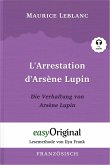In "Teresa of Watling Street," Arnold Bennett offers a poignant exploration of the life of a young woman navigating the complexities of early 20th-century English society. The novel, written in a realist style, reflects Bennett's keen insight into the urban experience and the struggles of individuality amid societal expectations. Set against the backdrop of the bustling streets of London, Bennett's narrative deftly combines rich character development with keen social commentary, providing a vivid portrait of Teresa's quest for identity and purpose in a rapidly changing world. His prose is marked by a detailed depiction of everyday life, underpinned by the psychological realism that was burgeoning in contemporary literature. Arnold Bennett, a prominent figure in the early modernist literary movement, was deeply influenced by his own experiences of working-class life in the potteries of Stoke-on-Trent. His background imbued him with a profound empathy for the struggles of ordinary people, which permeates his work. "Teresa of Watling Street" emerges as a reflection of his dedication to portraying the richness and complexity of everyday existence, as well as his desire to illuminate the often-unspoken challenges faced by women of his time. This novel is a thought-provoking read for those interested in the intersection of gender, class, and urban life. Bennett's nuanced portrayal of Teresa invites readers to reflect on their own lives and societal roles, making this book not only a captivating narrative but also a lens through which to examine the intricacies of human experience.
Bitte wählen Sie Ihr Anliegen aus.
Rechnungen
Retourenschein anfordern
Bestellstatus
Storno








